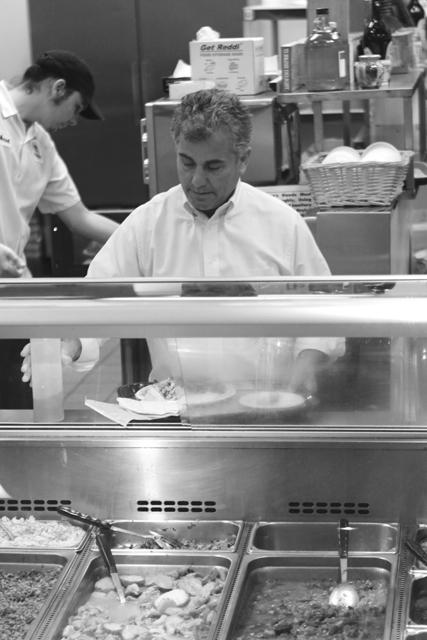There is more to Lebanese culture than the half-true connotations of Hezbollah and civil unrest. Cuisine is culture, and the Lebanese have an outstanding one to share just down the road.
Pita, falafel and hummus are taking college towns by storm. Besides cheap beer and Chinese take out, Mediterranean restaurants have become new essentials to the college experience.
Nonetheless, like most rampant trends, there are always trade-offs, and authenticity unfortunately tends to be the most compromised element in this business focused on profits and marketing.
However, Neomonde Lebanese Restaurant and Bakery defies this trend and continues to assert what it means to cook rustic and traditional Mediterranean food.
Neomonde opened in 1977 upon the arrival of Fahd Saleh, a Lebanese immigrant who left his country in the midst of political unrest and a gruesome civil war that carried on for decades.
Once he arrived to the United States, Saleh was determined to establish a restaurant that paid homage to his home and culture, which he regrettably had to abandon while seizing the opportunities that abounded in the “New World,” a phrase that inspired the name of the restaurant. Even after the death of Saleh, Neomonde continues to turn out Lebanese cuisine executed with the care and warmth found in a family kitchen.
Tucked behind Hillsborough Street on Beryl Road, Neomonde’s location does not attract too much traffic but nevertheless has a core group of patrons who consistently return to the restaurant.
The layout is impressive, with a large dining room on one half of the building and a grocery store on the other. In the middle, patrons order their food deli-style.
The staples of the restaurant include hummus, baba ganoush, stuffed grape leaves, pita and kebab. For a complete meal, it is not difficult to keep the price under $10.
Next to the cash register are enticing Middle Eastern desserts like baklava, pastries called mamoul stuffed with dates or nuts and lady fingers made with phyllo dough.
There is little pretension at Neomonde. The restaurant serves the food on disposable plates with plastic cutlery, but the intention is to let the food speak for itself. Unlike many fad restaurants, Neomonde bakes its own pita, as well as a selection of other artisan breads sold in its grocery store.
Moreover, the restaurant does not deviate from traditional recipes to satisfy the skepticism of the American palate. There are no chicken-caesar paninis nor basil pesto fusion wraps.
Neomonde’s goal is not to capitalize on the whim of the gastro-craze, but to serve Lebanese food that with little convincing overcomes any cultural barriers. The only requirement is a taste.
Authentic dishes Neomonde serves that would be pressing to find at faux-Mediterranean restaurants include kibbeh, a serving of ground meat lightly fried with spices and pine nuts; zaatar, a Lebanese pie served with dried spices; and a pizza-like pie called fatayer, with fresh cheese, tomato, olives and occasional meat topping.
With the convenience of its own bakery at its complete disposal, the baked pie dishes are produced cheaply without any gouging. These filling foods will not exceed $5.
The wait is minimal, and within 10 to 15 minutes the food comes out of the kitchen. The ambience of the restaurant is very casual and the dining room is not upscale, so Neomonde by virtue lends itself well to nonchalant dates and informal get-togethers.
The restaurant also provides a catering service, which Independent Weekly has rated highly.
The grocery store connected to the restaurant offers indigenous Middle Eastern goods not commonly available in American supermarkets.
Neomonde sells a variety of marinated olives, a selection of Arabic coffee and teas, snacks, juices and specialties like authentic feta cheeses, Lebanese olive oils and Middle Eastern kitchenware.
The grocery is not exclusive to Arabs or adventurous foodies. As an extension of the dining room, it invites people to browse through and find inspiration in food, which expresses an important statement.
Despite the tragedies and conflicts Lebanon and the greater Middle East have experienced in the past and undoubtedly will experience in the future, Neomonde showcases that the cuisine of the region transcends the negativity that unfortunately connotes Middle Eastern culture. One taste is enough to persuade the naysayers.
The Neomonde experience is one of little ostentation. The aim is to feel like eating in the comfort of a Lebanese home.








